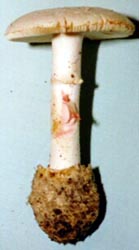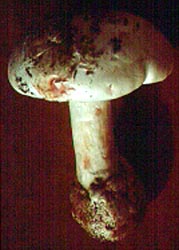|
[ Section Lepidella page. ]
[ Amanita Studies home. ]
[ Keys & Checklist/Picturebooks ] "Anise and Raspberry Limbed-Lepidella"
Technical description (t.b.d.) BRIEF DESCRIPTION: Amanita mutabilis has a white pileus 110 mm wide. Its stem (up to 130 x 22 mm excluding the bulb) is white and terminates below in a bulb (up to 80 x 50 mm) with a membranous, limbate volva. The annulus is skirt-like, attached near the top of the stem, and white to yellowish. The spores measure (8.7-) 10.0 - 14.6 (-18.9) x (5.0-) 6.0 - 8.0 (-12.6) Ám and are ellipsoid to elongate (rarely cylindric) and amyloid. Clamps are absent from the bases of basidia. When basidia are crushed, they often release granules that are dextrinoid. Before a specimen of A. mutabilis is handled, bruised, or smelled, it may suggest a robust specimen of A. bisporigera G. F. Atk. in the field. Two striking characters of this species are its odor and the staining of its context. When scratched, the flesh quickly turns the color of American raspberry sherbet. The odor (especially just as the collecting packet around a fresh specimen is opened) often is distinctly of anise. Odor alone is not a sufficient character for determining this mushroom because other species of Amanita in its geographic range also may smell of anise. This is a species of the pine-oak woods of the sandy coastal plain in the eastern United States. Its range extends from New Jersey to Florida and Texas. Bas placed A. mutabilis in his stirps Preissii (see the Australian species A. preissii (Fr.) Sacc.). It is interesting to compare A. mutabilis with another Australian species, A. rosea D.A. Reid. -- R. E. Tulloss Photo: Hanna L. Tschekunow (left, Florida); R. E. Tulloss (right, New Jersey).
[ Section Lepidella page. ]
[ Amanita Studies home. ]
[ Keys & Checklist/Picturebooks ] Last change 17 March 2009. |

